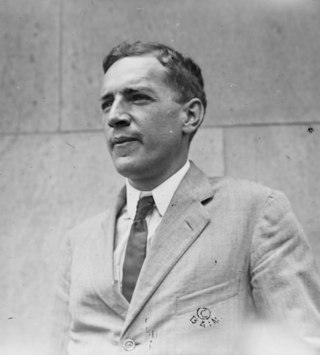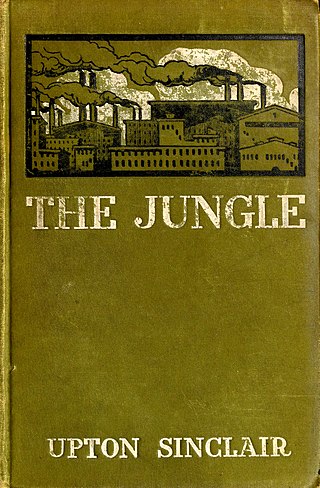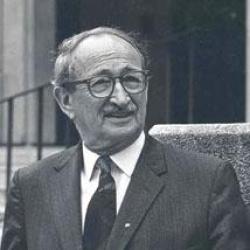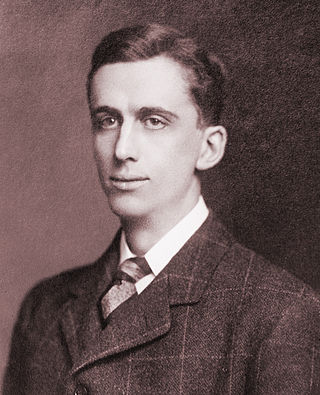Related Research Articles

The Federal Meat Inspection Act of 1906 (FMIA) is an American law that makes it illegal to adulterate or misbrand meat and meat products being sold as food, and ensures that meat and meat products are slaughtered and processed under strictly regulated sanitary conditions. These requirements also apply to imported meat products, which must be inspected under equivalent foreign standards. United States Department of Agriculture (USDA) inspection of poultry was added by the Poultry Products Inspection Act of 1957 (PPIA). The Food, Drug, and Cosmetic Act authorizes the Food and Drug Administration (FDA) to provide inspection services for all livestock and poultry species not listed in the FMIA or PPIA, including venison and buffalo. The Agricultural Marketing Act authorizes the USDA to offer voluntary, fee-for-service inspection services for these same species.

Upton Beall Sinclair Jr. was an American writer, muckraker, political activist and the 1934 Democratic Party nominee for governor of California who wrote nearly 100 books and other works in several genres. Sinclair's work was well known and popular in the first half of the 20th century, and he won the Pulitzer Prize for Fiction in 1943.

The Jungle is a 1906 novel by the American journalist and novelist Upton Sinclair. Sinclair's primary purpose in describing the meat industry and its working conditions was to advance socialism in the United States. However, most readers were more concerned with several passages exposing health violations and unsanitary practices in the American meat packing industry during the early 20th century, which greatly contributed to a public outcry that led to reforms including the Meat Inspection Act.

The muckrakers were reform-minded journalists, writers, and photographers in the Progressive Era in the United States (1890s–1920s) who claimed to expose corruption and wrongdoing in established institutions, often through sensationalist publications. The modern term generally references investigative journalism or watchdog journalism; investigative journalists in the US are occasionally called "muckrakers" informally.

Francis Otto Matthiessen was an educator, scholar and literary critic influential in the fields of American literature and American studies. His best known work, American Renaissance: Art and Expression in the Age of Emerson and Whitman, celebrated the achievements of several 19th-century American authors and had a profound impact on a generation of scholars. It also established American Renaissance as the common term to refer to American literature of the mid-nineteenth century. Matthiessen was known for his support of liberal causes and progressive politics. His contributions to the Harvard University community have been memorialized in several ways, including an endowed visiting professorship.

Sidney Hook was an American philosopher of pragmatism known for his contributions to the philosophy of history, the philosophy of education, political theory, and ethics. After embracing communism in his youth, Hook was later known for his criticisms of totalitarianism, both fascism and Marxism–Leninism. A social democrat, Hook sometimes cooperated with conservatives, particularly in opposing Marxism–Leninism. After World War II, he argued that members of such groups as the Communist Party USA and Leninists like democratic centralists could ethically be barred from holding the offices of public trust because they called for the violent overthrow of democratic governments.

Marxism is a left-wing to far-left method of socioeconomic analysis that uses a materialist interpretation of historical development, better known as historical materialism, to understand class relations and social conflict and a dialectical perspective to view social transformation. It originates from the works of 19th-century German philosophers Karl Marx and Friedrich Engels. As Marxism has developed over time into various branches and schools of thought, no single, definitive Marxist theory exists.
The connection between left-leaning ideologies and LGBT rights struggles has a long and mixed history. Prominent socialists who were involved in early struggles for LGBT rights include Edward Carpenter, Oscar Wilde, Harry Hay, Bayard Rustin, Emma Goldman and Daniel Guérin, among others.

Carrie Katherine "Kate" Richards O'Hare was an American Socialist Party activist, editor, and orator best known for her controversial imprisonment during World War I.
Harry Braverman was an American Marxist, worker, political economist and revolutionary. Born in New York City to a working-class family, Braverman worked in a variety of metal smithing industries before becoming an editor at Grove Press, and later Monthly Review Press, where he worked until his death at the age of 55 in Honesdale, Pennsylvania. Braverman is most widely known for his 1974 book Labor and Monopoly Capital: The Degradation of Work in the Twentieth Century, "a text that literally christened the emerging field of labor process studies" and which in turn "reinvigorated intellectual sensibilities and revived the study of the work process in fields such as history, sociology, economics, political science, and human geography."
The American Workers Party (AWP) was a socialist organization established in December 1933 by activists in the Conference for Progressive Labor Action, a group headed by A.J. Muste.

Ellen Meiksins Wood was an American-Canadian Marxist political theorist and historian.
The Intercollegiate Socialist Society (ISS) was a socialist student organization active from 1905 to 1921. It attracted many prominent intellectuals and writers and acted as an unofficial student wing of the Socialist Party of America. The Society sponsored lecture tours, magazines, seminars and discussion circles all over the US to propagate socialist ideas among America's college population. The group expanded into a philosophy in the 1920s that did not focus exclusively or even primarily on college students. To symbolize the shift in emphasis, the group changed its name to the League for Industrial Democracy in 1921.
The social novel, also known as the social problemnovel, is a "work of fiction in which a prevailing social problem, such as gender, race, or class prejudice, is dramatized through its effect on the characters of a novel". More specific examples of social problems that are addressed in such works include poverty, conditions in factories and mines, the plight of child labor, violence against women, rising criminality, and epidemics because of over-crowding and poor sanitation in cities.

The Appeal to Reason was a weekly left-wing political newspaper published in the American Midwest from 1895 until 1922. The paper was known for its politics, lending support over the years to the Farmers' Alliance and People's Party before becoming a mainstay of the Socialist Party of America, following that organization's establishment in 1901. Making use of a network of highly motivated volunteers known as the "Appeal Army" to spur subscription sales, paid circulation of the Appeal climbed to more than a quarter-million copies by 1906 and half a million by 1910, making it the largest-circulation socialist newspaper in American history.
Mitchell Cohen is an author, essayist and critic, He is professor of political science at Baruch College of the City University of New York and the CUNY Graduate Center. From 1991 to 2009, he was co-editor of Dissent, one of the United States' leading intellectual quarterlies. He is now an Editor Emeritus.
Kevin Mattson is an American historian and critic. Mattson received his B.A. from the New School and his Ph.D. from the University of Rochester. For several years he ran the Walt Whitman Center for the Culture and Politics of Democracy at Rutgers University,

James Graham Phelps Stokes, known as Graham Stokes was an American socialist, railroad president, political activist, and philanthropist. He was president of the Nevada Central Railroad for forty years.
Hal Draper was an American socialist activist and author who played a significant role in the Berkeley, California, Free Speech Movement. He is known for his extensive scholarship on the history and meaning of the thought of Karl Marx.
The proletariat is the social class of wage-earners, those members of a society whose only possession of significant economic value is their labour power. A member of such a class is a proletarian. Marxist philosophy considers the proletariat to be exploited under capitalism, forced to accept meager wages in return for operating the means of production, which belong to the class of business owners, the bourgeoisie.
References
- ↑ "Christopher Phelps - The University of Nottingham". Nottingham.ac.uk. Retrieved 11 August 2017.